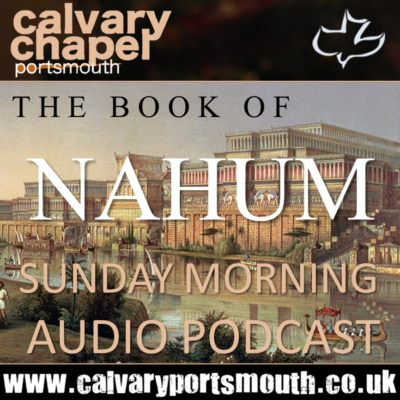This study of the book of Nahum was given by pastor Barry Forder on 20th Feb 2022 at Calvary Chapel Portsmouth.
The prophet Nahum writes somewhere between 663 B.C. and 612 B.C., prophetically detailing the downfall and destruction of Nineveh, the capital of the Assyrian Empire which had dominated the world for over 300 years.
Some 200 years before Nahum, God had sent Jonah on a ‘mercy mission’ to warn them to turn from their wicked ways to avert judgment (God always warns and gives ample opportunity for repentance before pouring out His wrath). Upon hearing Jonah’s message, Nineveh repented and God relented of the judgement He was going to bring.
However, their repentance was short lived and they quickly reverted to their old ways.
The line had now been crossed, God was jealous for Israel as a husband for a wife who had been unjustly treated at the and of another.
God states that He is now ‘furious’ with Assyria and that “the Lord will take vengeance on his adversaries, and he reserveth wrath for his enemies. The Lord is slow to anger, and great in power, and will not at all acquit the wicked” (Nahum 1:2-3).
From what we know, Nahum was born in Capernaum in Galilee, northern Israel – Capernaum means ‘village of Nahum’.
Yet, in the introduction he is referred to as ‘Nahum the Elkoshite’, which commentators think could be a reference to Aklush, a town near modern Mosul in Iraq, and in Nahum’s time, on the outskirts of Nineveh.
That being the case, it is probable that Nahum was among those of the norther kingdom of Israel who had been taken captive by Assyria in 722 B.C. and had witnessed first-hand the cruelty of the oppressive Assyrian Empire.
Certainly, history records that Assyria were the most feared empire the world had known, with a reputation for barbaric cruelty.
Ashurnasirpal II (883-859 B.C.) boasted, “I stormed the mountain peaks and took them. In the midst of the mighty mountain I slaughtered them; with their blood I dyed the mountain red like wool. . . . The heads of their warriors I cut off, and I formed them into a pillar over against their city; their young men and their maidens I burned in the fire.”
Regarding one captured leader, he wrote, “I flayed [him], his skin I spread upon the wall of the city”
He also wrote of mutilating the bodies of live captives and stacking their corpses in piles.
— Luckenbill, Ancient Records of Assyria and Babylonia, 1:148, 146
Shalmaneser II (859-824 B.C.) boasted of his cruelties after one of his campaigns: “A pyramid of heads I reared in front of his city. Their youths and their maidens I burnt up in the flames”
Sennacherib (705-681 B.C.) wrote of his enemies, “I cut their throats like lambs. I cut off their precious lives [as one cuts] a string. Like the many waters of a storm I made [the contents of] their gullets and entrails run down upon the wide earth. . . . Their hands I cut off”
Ashurbanipal (669-626 B.C.) described his treatment of a captured leader in these words: “I pierced his chin with my keen hand dagger. Through his jaw . . . I passed a rope, put a dog chain upon him and made him occupy . . . a kennel”
Whole cities had been known to commit suicide rather than fall into the hands of the Assyrian kings.
God, through Nahum, specifically charges Nineveh with immorality, idolatry (including witchcraft), trading people as commodities and the devaluing of human life. It is uncanny how much this resembles the world today; and if Nineveh were overdue for judgment, how much more the arrogant God-rejecting world of today!
But this is the message of Nahum, God will avenge the wrongs done to His people.
Nahum’s prophecy is so descriptive and has been thoroughly verified through archaeology that sceptics of course claim that it had to have been written after the events! But Nahum’s message is not just one of judgment for Assyria, it is one of comfort for Israel. Nahum’s name means ‘comfort’, and in the most well-known verse from Nahum he states: “Behold upon the mountains the feet of him that bringeth good tidings, that publisheth peace! O Judah, keep thy solemn feasts, perform thy vows: for the wicked shall no more pass through thee; he is utterly cut off.” (Nahum 1:15)
It is a message of peace that resonates to this day. God sees, and will not let the wickedness and injustice in this world continue indefinitely, but He is a jealous God who deeply cares and watches over His own!
But the book of Nahum also serves as a warning that it is time to decide, a time to pick which side you are on. Are you on the Lord’s side? Or are you given over to the things of this world?
Twice God declares to Nineveh: “Behold, I am against thee” (Nahum 2:13 / 3:5). What a contrast to the one who has humbled themselves before God and put their faith and trust in Him: “If God be for us, who can be against us?” (Romans 8:31).
There is a choice, God can either be for you or against you. Learn the lesson of Nineveh, you cannot stand against God!


